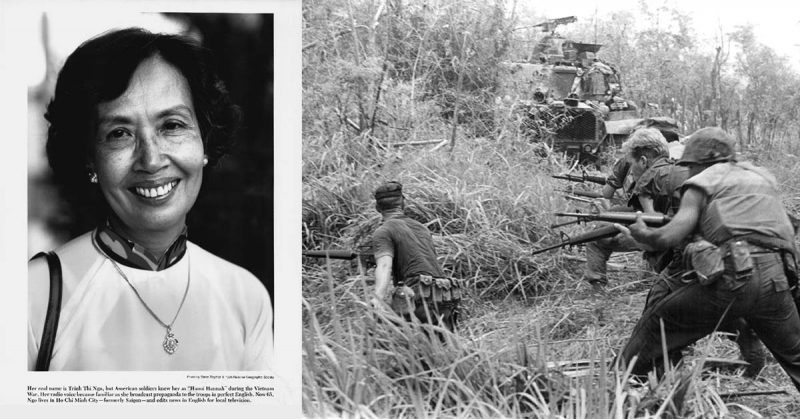Trinh Thi Ngo was the soft-spoken radio announcer known as Hanoi Hannah to the American troops in Vietnam who were entertained by her even as she tried to convince them that the war was immoral. She died recently in Ho Chi Minh City. She was believed to be 85 years old.
Her death was confirmed by a former colleague, Nguyen Ngoc Thuy. They worked together at Voice of Vietnam, the state broadcaster. Ngo was being treated for liver ailments at the time of her death.
Ngo would broadcast in English, reading propaganda from North Vietnam as it fought the US and the South Vietnamese governments.
She followed in the tradition of Tokyo Rose and Axis Sally who tried to reduce the morale of American troops in World War II.
According to Thuy, Ngo was a national celebrity and a role model for her colleagues. “We admired her perfect voice and her legendary role,” Thuy said.
Ngo was born in 1931 in Hanoi, the capital of Vietnam when it was a French colony. The precise date of her birth is not available.
She learned English from private tutors because she enjoyed American films like “Gone With the Wind.”
“I always preferred American movies to French film. The French talked too much. There was more action in American movies,” she said.
Ngo began broadcasting in 1955 for Voice of Vietnam, a year after Vietnamese rebels forced the French out of Indochina.
Early in her career, she took the name Thy Huong, or Autumn Fragrance, because it was easier for her listeners to pronounce.
She began broadcasting to the American troops in 1965 and was still on the air in 1975.
As part of her program, she would announce the names of the American soldiers who had died the month before.
One of her listeners was John McCain, who would go on to become a US Senator. At the time, he was a Navy pilot who was shot down and captured by the North Vietnamese. He spent more than five years as a prisoner of war.
“I heard her every day. She’s a marvelous entertainer. I’m surprised she didn’t get to Hollywood,” McCain said during a visit to Hanoi in April of 2000.
Ngo took a friendly approach to her listeners as she played anti-war folk songs. Beneath her friendly veneer, though, was a confidence in the North Vietnamese cause, The New York Times reported.
“My work was to make the G.I.s understand that it was not right for them to take part in this war. I talk to them about the traditions of the Vietnamese, to resist aggression. I want them to know the truth about this war and to do a little bit to demoralize them so that they will refuse to fight,” she said in a 1994 interview.
She said the reason the Americans called her Hanoi Hannah was simple, “The Americans like nicknames.”
